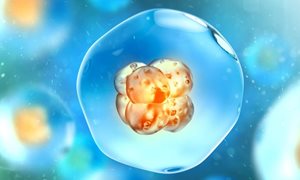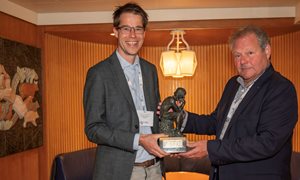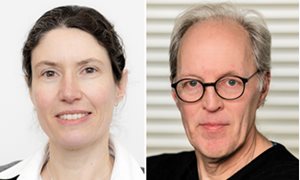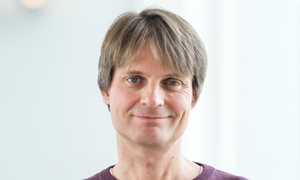
The “Pluripotent Stem cells for Inherited Diseases and Embryonic Research (PSIDER)” programme of the ZonMw supports projects using induced pluripotent stem cells (iPS cells) for biomedical research. These iPS cells can give rise to any type of cell in the body and therefore hold great promise for regenerative medicine. Michiel Vermeulen and Klaas Mulder (from Faculty of Science of Radboud University and part of the interfaculty research institute RIMLS.) participate in a consortium that receives 3.5 MEuro funding from this programme to study blastoids as a model system of early human embryonic development.
Beyond the blastocyst: modeling human embryology with stem cells
When mistakes occur during cell division, cells can end up with an unequal number of chromosomes. This is called chromosomal aneuploidy. Chromosomal aneuploidies are frequently found in human IVF embryos and are a main cause of pregnancy loss. Progress in the study of human development and the impact of aneuploidies is slow due to the limited number of embryos available for research and experimental and ethical constraints. Michiel Vermeulen and Klaas Mulder, in collaboration with researchers from Erasmus MC – Derk ten Berge, Esther Baart and Hafez Ismaili M’hamdi – the Hubrecht Institute –– Jop Kind and Ina Sonnen – and IMBA (Vienna, Austria) – Nicolas Rivron, will analyze the mechanisms of early human development at an unprecedented level of cellular and molecular detail using so-called human blastoids. These blastoids model embryos of approximately 5 days after fertilization – the blastocyst-stage – and are generated entirely from cultured stem cells.
The researchers will combine cutting-edge single-cell and multi-omics technologies to construct a 4D map of human development and dissect the cellular interactions that guide early decisions about the type of cell that is formed and how it will be shaped. They will then investigate how chromosomal aberrations affect these developmental mechanisms and explore interventions that promote healthy development. In complementary research, they will develop an ethical framework for sound policy-making with regards to human embryo model research and its clinical applications.
Related news items

Dutch Society of Clinical Chemistry Science & Innovation Award for the team of Hans Jacobs
14 June 2022 The team of Hans Jacobs pioneers on the development of personalized diagnostics to measure minimal residual disease in patients with multiple myeloma. go to page
ZonMw Open Competition Grant for Annemiek van Spriel and Piet Gros
15 June 2021 Annemiek van Spriel, theme cancer development and immune defense, together with Piet Gros, Dept. of Chemistry, Utrecht University obtained a ZonMw Open Competition Grant to investigate IL-6 receptor structure and signalling in tumor cells. go to page
HFSP Grant for Johannes Textor
30 March 2020 Johannes Textor, theme Cancer development and immune defense, has been awarded a program grant of 1 million US dollars by The Human Frontier Science Program (HFSP) to investigate how T cells navigate extremely dense environments using experiments, modeling and methods from pedestrian dynamics. go to page
NWO open call GROOT grant for Michiel Vermeulen
24 February 2020Michiel Vermeulen, theme Cancer development and immune defense, received a 300,000 EUR grant within the NWO-GROOT consortium. He will use mass spectrometry-based proteomics and interaction proteomics applications to study proteome and gene expression dynamics during early C. Elegans development.
go to page
NWO open call GROOT grant for Peter Friedl
24 February 2020 Peter Friedl, theme Cancer development and immune defense, received a 300,000 EUR grant within the NWO-GROOT consortium "Active matter of cancer metastasis" to identify the mechanisms of collective metastasis in breast cancer. go to page